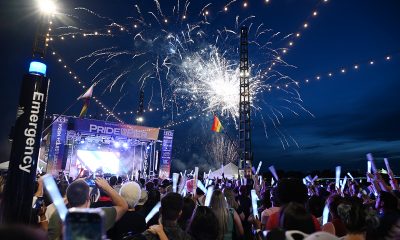Arts & Entertainment
What the Blade means to me
Former employees reflect on impact of the newspaper
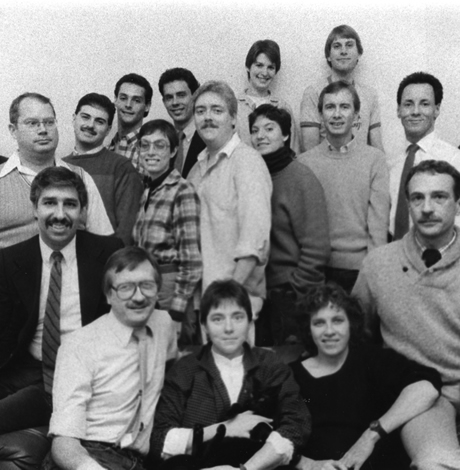
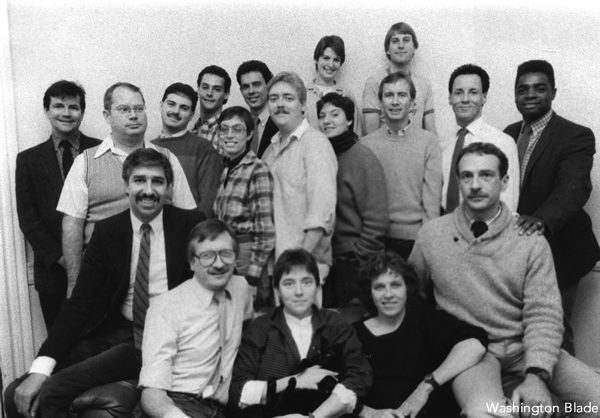
As we wrap our yearlong celebration of the Washington Blade’s 50th anniversary, we wanted to provide space to former employees to reflect on what the newspaper means to them. Here is a sampling of what they had to say. Thanks to everyone for contributing.
JERYL PARADE, Blade account executive, 2009-2016
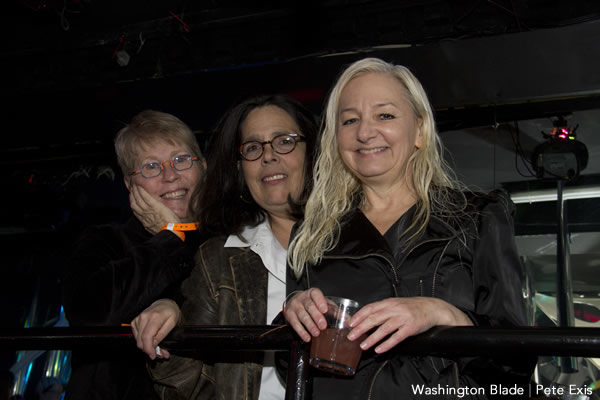
“I need to tell you this is the last issue of the newspaper you will be delivering. It’s not you. It’s us. We’re shutting down.”
“What will you do?”
“Look for a job. But not here. In D.C.
“You should apply at the Blade.”
“The Blade?”
“We’ve been there trying to get their distribution business. You should see the offices. They’re beautiful”.
“Yeah. OK. Thanks for the advice.” But I’m not gay.
On July 26, 2009, I emailed publisher Lynne Brown my three-page resume with 18 bullet points of publishing accomplishments. She responded on July 31, 2009. “Thanks for writing. There are only opportunities in life.”
In a subsequent email we agreed to meet on Wednesday at 11 a.m. Lynne wrote, “We are generally a casual group. So dress to be yourself.”
I did not know if she meant this or was being crafty. Should I really show up in a ‘90s Goth thing? I decided on a business suit. The Blade is, after all, a business.
And then some!
Happily I got the job. It was advertising sales. I had been a manager for 25 years, but when you work with clients, as I had, you are in sales.
I am able to tell on the first day of a new job if it is going to work out. On that first day — even though all I did was read the employee manual — I felt good. I was breathing in fresh air.
The next day I made my first sales call. It resulted in a sale. You know it can take 10 or more calls or emails to connect with someone and five or more contacts with said someone to seal the deal. If you’re lucky. Not so with the Blade. I was batting 1,000 percent!
Still, I was feeling stilted compared to my debonair coworkers. I remember seeing a team photo from the previous holiday season. Everyone dressed in black. I don’t think anyone was smiling. I would never be as cool as that.
About two and a half months into my tenure, on Monday, Nov. 16, 2009, we came in to work and were told (by the then parent company) to go home. Plenty has been written about the days and weeks that followed. I won’t go into that here. I consulted with my father about what to do next. I told him how the employees had a plan to keep publishing. My dad advised me to stay. He said, “It might be better.”
From then on I learned how to work on a commission-only basis and have confidence in my own and our success. I had always worked at a desk, in an office. Now I was free. An advertiser would call me on my cell while I was on the streets of downtown D.C. How cool was I now? I was Blade cool.
One of my most vivid memories of working for the Blade is from 2013 in the Venetian Jewish Ghetto. My friend was on a tour while I was in the piazza taking a call from the Washington Women’s Rugby Football Club (DC Furies) about advertising in our LGBTQ Sports Issue. I had sent an email blast earlier that week from our hotel room in Rome to let everyone know I had previewed the content and it was amazing!
Being “not gay” was never an issue. My advertisers and co-workers did not care which of the letters comprising the acronym I was. I had always assumed it was A for Ally. Now I know. It’s G. For Grateful.
KEN SAIN, Blade news editor, 2003-2005
Perhaps the most important thing we have learned since Stonewall is that visibility is everything. Many of the advances the LGBTQ community has made in these past decades are because ordinary people had the courage to come out.
Each generation has made it easier for the next, and the current one will make it even easier for those who follow. It was far easier in those early years for an Anita Bryant and others to go argue for discrimination when it was just some drag queens no one knew in San Francisco who were denied rights and being assaulted.
It’s a lot harder to make that case when it’s your uncle, or sister, or child.
So yes, give credit to the leaders for inspiring us and willing to be the face that took the criticism. But remember that each of us who had the courage to tell our truth to family and friends and co-workers also did our part to help change public opinion.
And give some credit to the Washington Blade. For 50 years it has been covering the struggle, helping to inspire new generations by telling the stories of those who came before. It was a source of news for our community when others didn’t even acknowledge our issues. The Blade did so while maintaining the highest standards of journalism and ethics.
I know from my time as news editor what a vital role the Blade has in the community. I like to think that by covering the community fairly and with integrity we achieved our goals of informing and in some cases entertaining readers. I also believe that by putting a spotlight on the stories of our community, we helped moved the needle on public opinion in some small way.
I am deeply proud of my time working for the Blade and the work we did. There is something special about working with quality people on a righteous cause. Our cause was to show that we could do great journalism for LGBTQ readers and keep them informed of the issues that that in many cases no one else was covering.
In doing so, we helped make our community more visible. And as we’ve learned during these past 50 years, being more visible is one key to being accepted.
Happy 50th anniversary, Blade.
KRISTINA CAMPBELL, Blade reporter, managing editor and editor, 1992-2002
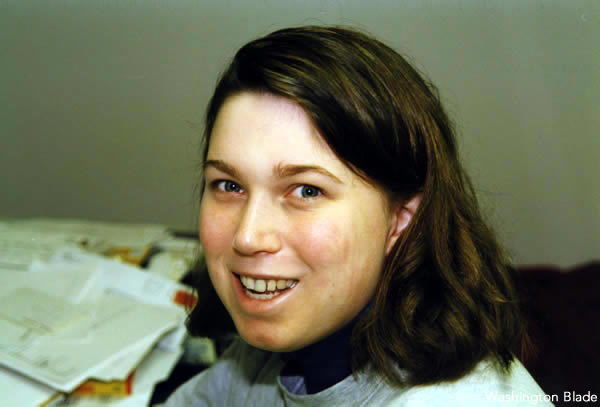
The thing I remember most about the Blade was the company’s elegant balance as a fun and often lighthearted atmosphere that was also a professional workplace where we were serious about our mission and our product. I felt close to everyone in the newsroom, especially as I rose the editor ranks and started supervising people who had been my colleagues. It was an honor to be trusted with that role. I remember the work being challenging but rewarding, every day of my tenure there, until the ownership changed and some workplace issues started clouding my focus on the news. I felt an obligation to the community the entire time I worked at the Blade, because it was so important to get the information correct, to be fair, to create a record for information and developments that the mainstream media was only beginning to cover. And I also felt a responsibility to act with objectivity and to give fair and respectful treatment to adversaries of the community or its civil rights work. That was sometimes difficult, but it made me a better journalist and, I think, a better person.
I grew up in that job, and I had fun doing it. It was an exciting time to cover gay civil rights issues — news was always developing and it felt like we as a community were on the brink of big things. Indeed, the big things gradually took shape. I often think about the current presidential administration and how working at the Blade would be so different now, and likely frustrating, as significant pieces of the progress we covered is at risk of (or in the process of) being rolled back.
The Blade was, I insisted then and maintain now, the most reliable and professional source of hard news about the gay movement anywhere in the world when I worked there, for most of the 90s and into the next decade, And that was quite something to be part of. I always had such deep respect for the people who hired me and shaped me into a professional — Don Michaels and Lisa Keen — because they gave their careers to being the daily historians of a civil rights movement. The same is true for the longest-tenured Blade staffer in history, Lou Chibbaro Jr., whose professionalism and hard-nosed reporting style made each issue of the paper better. I was fond of everyone on the staff, but those three really made that newspaper into an institution I was proud to participate in.
RHONDA SMITH, Blade reporter, features editor, 1997-2005; intern, 1984
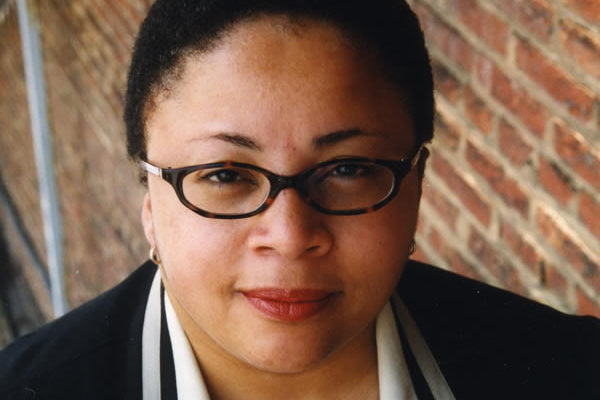
I was a journalism undergraduate at Howard University during the early 1980s when I became an intern at the Washington Blade under the tutelage of Lisa Keen and Don Michaels. At the time, I was just coming out and trying to find my way in the world as the daughter of a Southern Baptist minister and a public school teacher from a small town in Texas. The Blade helped shape a key part of my identity in a way that few others did at that time.
I get nitty-gritty details about the LGBTQ experience from the Blade that other media organizations might still tend to gloss over. Writers and editors at the Blade take a deeper dive on topics that help determine the extent to which we thrive. The Blade reminds me that my sexual orientation is a blessing that should be embraced.
My favorite memory working at the Blade: Watching Lou Chibbaro, Jr. get the story.
BRIAN MOYLAN, Blade intern, reporter and features editor, 2000-2006
Gather round, children and let Grandpa Moylan tell you about the bad old days before marriage equality, Grindr, and RuPaul’s Drag Race. In 2000, during my senior year at George Washington University I was about to graduate and needed a job badly. As an English major with a minor in Thursday College Night at Badlands, I didn’t have many prospects, so I opened up the Washington Blade and faxed my resume to every job listing in the want ads. Don’t worry, kids, if you don’t understand half of the things in the previous sentence.
The only two responses I got from my resume were from the Blade itself and the Crew Club, both of them situated on 14th Street when you were more likely to see a prostitute or a shooting in the area rather than an Aesop. I interviewed at the Blade and, as I was getting dressed to go to my interview at the Crew Club, managing editor Kristina Campbell called and told me I got the job. I decided to ditch the Crew Club and become a journalist instead of a jizz mopper. It was my Gwyneth Paltrow “Sliding Doors” moment.
I was an editorial assistant making $22,000 a year, which was not very much even back then. One of my first responsibilities was to go to the Supreme Court and pick up the rulings for Boy Scouts of America V. Dale, where the court ruled it was perfectly acceptable for private groups to discriminate against gay people. It was a startling setback and I thought, “This is going to be a tough job if the news is always this bad.”
The news, back then was often bad: Iowa’s governor rescinded gay protections already in place, several states banned same-sex adoptions, the Millennium March stiffed its vendors, hate crimes bills got voted down left and right, “Brokeback Mountain” lost to “Crash.” Seriously? Crash?! To make it even worse, Cobalt even burned down. Then George W. Bush was elected and things got even worse as that closet case Ken Mehlman used gay marriage bans to stoke Republican turnout at the polls. Often being at work was painful.
But looking back at my time at the Blade (where I eventually rose to be the features editor before I quit in 2006 to move to New York), I don’t remember all of that awful news. Most of all what I remember is the amazing people I worked with, especially Campbell, Lyn Stoessen, and Will O’Bryan, the patient lesbians who taught me how to be a journalist. (Don’t worry, Will always self-identified as a lesbian.) And of course I think of Kevin Naff, still running the gay paper of record, and Lou Chibbaro Jr., the best reporter I have ever encountered in 20 years in journalism. (I also think of the one coworker I slept with, but we should probably not be naming names.)
Secondly, what I remember are all of the amazing events I covered. As an editorial assistant I had to go to a gay community meeting every week and report on it. I met gay SCUBA divers, Black and White Men Together, gay gun enthusiasts, Log Cabin Republicans, and gay affinity groups for every religion you could possibly imagine, including gay atheists. I think of every High Heel Race, all of the Black Prides, each of Ed Bailey’s amazing Madonnaramas at Velvet Nation, all the gay cowboys at the Atlantic Stampede, every film I reviewed at the Reel Affirmations film festival (even the wretched musical based on Matthew Shepherd’s murder).
The Blade ushered a 21-year-old kid from a small town in Connecticut into a gay community far more vibrant than he ever could have imagined. It taught me that no matter how bad things got or how slowly progress came, that we always had each other, that there was always a reason to celebrate, and another Halloween was just around the corner.
By and large many of the things we were fighting for back in the early 2000s — marriage equality, the end of the gay military ban, outing Ken Mehlman — have come to pass. Gay news these days is much sunnier and is covered by every outlet from Vice to the New York Times. But that doesn’t mean that the Blade is obsolete. The one thing it will always have going for it is that it is of the community and by the community. No one else had the dedication or support to make it through 50 years of the bad old times. I couldn’t be more proud to be a part of that legacy. Back in 2000, the Blade gave me a job and since then it has given me a career in media. But the most important thing it gave me, that it still gives me, is hope.
PHILIP VAN SLOOTEN, Blade intern, 2019
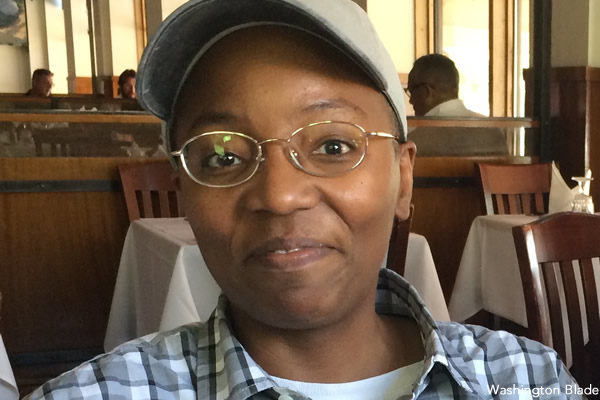
It’s important for the LGBTQ community and our issues to be treated respectfully and normalized in the same manner that mainstream media does for the cisgender-heterosexual community. The Blade takes our lives and opinions on all topics seriously and not just as “quirky” news. For example, the Blade would interview a drag performer about their political views and that becomes the news whereas the news for the straight press is simply that someone performs in drag. Their level of education or insights aren’t of interest.
I’ve read a few other LGBTQ publications in the region and very few strive to elevate LGBTQ discourse beyond the sensational.

‘A Wrinkle in Time’
Through July 20
Arena Stage
1101 Sixth St., S.W.
Tickets range from $59-$209
Arenastage.org
Currently at Arena Stage, talented out actor and singer Taylor Iman Jones is rekindling an old friendship with an adored character of fiction.
Broadway vet Jones is starring as 13-year-old Meg Murry in “A Wrinkle in Time,” the world-premiere musical adaptation of Madeleine L’Engle’s same-titled book.
For many readers, especially women, the classic 1962 young adult novel, was their first foray into sci-fi, particularly one with a female protagonist.
The story centers on Meg, an awkward schoolgirl whose physicist father has mysteriously disappeared. Now, Meg, her popular friend Calvin, and smart younger brother Charles Wallace are tasked with moving through time and space to find him. Along the way they encounter adventure and evil.
For Jones, 33, playing 13-year-old Meg feels freeing in ways. She says, “As you get older, you’re told to grow up, so I like letting go of some of that. To feel feelings in their rawest form and to tap back into that is fun. I like the spontaneity. There are highs and lows to revisit.”
Born and raised in the San Francisco Bay Area, Jones began piano lessons at just six and soon added band and plays to their pursuits. Following high school, she made a deep dive into California theater for seven years before making the big move to New York in 2017 where after just two months she was singing on Broadway.
The determined and appealing Jones, who lives in New York with their partner, boasts an impressive bio. She has appeared on Broadway as Catherine Parr, Henry VIII’s sixth and final wife in Six, and in the original casts of “Head Over Heels” and “Groundhog Day.” She’s been seen in national tours of “Hamilton” and “American Idiot.”
WASHINGTON BLADE: It seems “A Wrinkle in Time” and Meg mean a lot to a lot of people.
TAYLOR IMAN JONES: The book tells the story of a girl with so much undiscovered power who’s accomplishing things she never imagined that she could.
BLADE: Can you relate?
JONES: Meg wears her emotions on her sleeve. I can certainly relate to that. I’m a Pisces. Sometimes being hyperemotional and very empathetic can feel like a burden, but as I’ve matured, I have realized that it’s not a bad quality. And it’s something I’ve learned to harness and to enjoy. I love that I can play a role like Meg in front of thousands of people.
BLADE: Was “Wrinkle in Time” a book you knew well?
JONES: Oh yeah, it’s a favorite book that lives in my heart and my mind. It’s one of the first books that taught me about the adventure of reading.
BLADE: And playing a favorite character must be a kick.
JONES: It really is.
BLADE: Meg is a big part in a big show.
JONES: This musical is huge. They’re traveling through space and meeting people on different planets. 20-person cast. 30 songs in the show. Quite the undertaking and I’m proud of us. I’m on stage for the entire musical and I sing four or five numbers.
As a mezzo soprano I guess you’d say I have the luxury of being able to do a lot of musicals that span a lot of different genres: rock musical, pop musical, and standards. “A Wrinkle in Time” is contemporary musical theater.
For me, singing is probably the least difficult part of the show. What’s harder for me is the way Meg experiences trauma; I need to be careful when I’m screaming and yelling.
BLADE: It seems mostly women have been involved in making this production happen (book by Lauren Yee; music and lyrics by Heather Christian; directed by Lee Sunday Evans; and choreography by Ani Taj.)
JONES: It’s true, the director, writer, etc., and most of our producers are all women. This doesn’t happen most of the time. For me it means new ideas and fresh energy, and pushing the limits of musical theater.
It’s also created a wonderful space in which to work. It can be more generous, and understanding. And centering the story on a young girl is something we can all relate to.
BLADE: Will “A Wrinkle in Time” resonate with queer theatergoers and their families?
JONES: I think so, especially on the heels of pride month. It’s truly a show for all ages about finding your inner strength and fighting for the things that you love; not letting evil win over the power of good, and not just for yourself but for those around you too.
Movies
Two new documentaries highlight trans history
‘I’m Your Venus’ on Netflix, ‘Enigma’ on HBO/Max

One of the most telling things about queer history is that so much of it has to be gleaned by reading between the lines.
There are the obvious tentpoles: the activism, the politics, the names and accomplishments of key cultural heroes. Without the stories of lived experience behind them, however, these things are mere information; to connect with these facts on a personal level requires relatable everyday detail — and for most of our past, such things could only be discussed in secret.
In recent decades, thanks to increased societal acceptance, there’s been a new sense of academic “legitimacy” bestowed upon the scholarship of queer history, and much has been illuminated that was once kept in the dark. The once-repressed expressions of our queer ancestors now allow us to see our reflections staring back at us through the centuries, and connect us to them in a way that feels personal.
One of the most effective formats for building that connection, naturally enough, is documentary filmmaking — an assertion illustrated by two new docs, each focused on figures whose lives are intertwined with the evolution of modern trans culture.
“I’m Your Venus,” now streaming on Netfllix, bookends an iconic documentary from the past: “Paris is Burning (1990), Jennie Livingston’s seminal portrait of New York City’s ballroom scene of the ‘80s. In that film, a young trans woman named Venus Xtravagana delivered first-person confessionals for the camera that instantly won the hearts of audiences — only for them to break with the shattering revelation that she had been murdered before the film’s completion.
That 1988 murder was never solved, but Venus — whose surname was Pellagatti before she joined the House of Xtravaganza – was never forgotten; four decades later, her family (or rather, families) want some answers, and filmmaker Kimberly Reed follows her biological siblings — Joe, Louie, and John, Jr. — as they connect with her ballroom clan in an effort to bring closure to her loss; with the help of trans advocates, they succeed in getting her murder case re-opened, and work to achieve a posthumous legal name change to honor her memory and solidify her legacy.
It’s a remarkably kind and unapologetically sentimental chronicle of events, especially considering the brutal circumstances of Venus’ killing — a brutal death by strangling, almost certainly perpetrated by a transphobic “john” who left her body hidden under a mattress in a seedy hotel — and her decision to leave her birth family for a chosen one. As to the latter, there are no hard feelings among her blood relatives, who assert — mostly convincingly — that they always accepted her for who she was; one senses that a lot of inner growth has contributed to the Pallagatti clan’s mission, which admittedly sometimes resembles an attempt at making amends. For the murder itself, it’s best to leave that part of the story unspoiled — though it’s fair to say that any answers which may or may not have been found are overshadowed by the spirit of love, dignity, and determination that underscore the search for them, however performative some of it might occasionally feel. Ultimately, Venus is still the star of the show, her authentic and unvarnished truth remaining eloquent despite the passage of more than 40 years.
Perhaps more layered and certainly more provocative, documentarian Zackary Drucker’s “Enigma” (now streaming on HBO/Max) delves further back into trans history, tracing the parallel lives of two women — trans pioneer and activist April Ashley and self-styled European “disco queen” Amanda Lear — whose paths to fame both began in Paris of the 1950s, where they were friends and performers together at Le Carrousel, a notorious-and-popular drag cabaret that attracted the glitterati of Europe.
Ashley (who died at 86 in 2021) was a former merchant seaman from Liverpool whose “underground” success as a drag performer funded a successful gender reassignment surgery and led to a career as a fashion model, as well as her elevation-by-wedding into British high society — though the marriage was annulled after she was publicly outed by a friend, despite her husband’s awareness of her trans identity at the time of their marriage. She went on to become a formidable advocate for trans acceptance, and for environmental organizations like Greenpeace, who would earn an MBE for her efforts, and wrote an autobiography in which she shared candid stories about her experiences and relationships as part of the “exotic” Parisian scene from which she launched her later life.
The other figure profiled by “Enigma” — and possibly the one to which its title most directly refers — is Amanda Lear, who also (“allegedly”) started her rise to fame at Le Carrousel before embarking on a later career that would include fashion modeling, pop stardom, and a long-term friendship with surrealist painter Salvador Dalí. A self-proclaimed “disco queen” whose success in Europe never quite spread to American culture (despite highly public associations with musical icons like David Bowie and Roxy Music), Lear’s trajectory has taken her in a different direction than Ashley’s. In the film’s extensive live interview segments, she repeatedly denies and discredits suggestions of her trans identity, sticking to a long-maintained script in which any and all details of her origins are obscured and denied as a matter of course.
At times, it’s almost amusing to observe her performative (there’s that word again) denials, which occasionally approach a kind of deliberate “camp” absurdity in their adamance, but there’s also a kind of grudging respect that’s inspired by the sheer doggedness with which she insists on controlling the narrative — however misguided it may seem to those of us on the outside. Debate about her gender-at-birth has continued for decades, even predating Ashley’s book, so the movie’s “revelations” are hardly new, nor even particularly controversial — but her insistence on discrediting them provides sharp contrast with the casual candor of Ashley’s elegantly confident persona, underscoring the different responses to transphobia that would direct the separate lives of both these former (alleged) friends.
For what it’s worth, Lear sent an email to the Washington Post, calling the movie “a pathetic piece of trash” and denying not just her trans identity but any friendship or association with Ashley, despite ample photographic and anecdotal evidence to the contrary — and while it might come across as callous or desperate for her to maintain the presumed façade, it’s a powerful testament to the power of cultural bullying to suppress the truth of queer existence; the contrast between the life each of these women chose to live speaks volumes, and makes “Enigma” into one of the most interesting — and truthful — trans documentaries to emerge thus far.
While neither film presents a comprehensive or definitive view of trans experience (is such a thing even possible, really?), both offer a perspective on the past which both honors the truth of queer existence and illustrates the ways in which the stigma imposed by mainstream prejudice can shape our responses to the identity through which we are perceived by the public.
That makes them both worth your attention, especially when our queer history — and the acknowledgement of trans existence itself — is at risk or being rolled right back up into the closet.
Sports
Trans cyclist’s victory sparks outrage in conservative media
Katheryn Phillips is originally from DC

On the heels of UPenn erasing the record of the first openly transgender NCAA Division I All-American swimmer and the U.S. Supreme Court’s decision to tackle bans on trans student-athletes, right wing media is now all hot and bothered about the latest trans woman who won a cycling championship — even though she competed according to the rules.
On Tuesday, 58-year-old Katheryn Phillips finished first in USA Cycling’s Lyons Masters National Championship race for women aged 55-59, with a time of 1:42:10, according to the official results posted by the organization. The record shows her gender as “F” for female.
One second behind Phillips was Julie Peterson, with a time of 1:42:11 — as were three other cyclists: Mary Beth Grier, Andrea Cherniak-Tyson, and Carolyn Maddox.
Peterson, 57, was so outraged, she told Fox News she refused to stand on the podium in second place next to Phillips. Her story was swiftly shared by the New York Post (also owned by Fox’s parent company News Corp.), the Daily Mail, Breitbart, and other conservative media.
Both Peterson and another competitor are accusing USA Cycling of “hiding” that a transgender woman had registered to race.
“It was hidden from us. Katheryn Phillips, KJ’s name, was not on that list. And I checked it up all the way to the point of closure when we couldn’t register online anymore,” Debbie Milne told Fox.
“If I had known, I wouldn’t have spent thousands of dollars in travel and time off work to come and do a race,” Peterson said. Fox welcomed Milne, 56, who finished seventh on Tuesday, to Fox & Friends Thursday morning.
(Video courtesy of Fox News)
Peterson told Fox she did complain to USA Cycling officials prior to the race. Both Milne and Peterson referred to Phillips as a male, and with “he/him” pronouns.
“To be fair to all humans, if we want to say ‘him’ or ‘her,’ he was born a biological male, that is a fact,” Milne said. “And that is the thing that makes it an unfair advantage. Whatever has happened after that is a whole different topic.”
“I said, ‘I don’t want to race against a man,’ and they quickly scolded me and said ‘Oh, you can’t call him a man,’ and I’m like ‘Well, he is a man,’ so I was quickly scolded and corrected that it is a woman and I don’t even know what to say.”
USA Cycling did not respond to the Washington Blade’s emails requesting comment.
Phillips, who goes by Kate and by “KJ,” is a former rugby player with the D.C. Furies, who stated in the comments of a 2024 article published by Zwift Insider that she was the first out trans athlete in the U.S. to compete under the 2004 International Olympic Committee’s guidelines on trans participation.
“When USA Rugby told me about the IOC decision in 2004, I raised my hand to be included. I experience nothing but joy when I play, ride, and race,” Phillips said.
As the Blade has reported, the International Olympic Committee drastically revised those rules in 2021, and in March, Republican lawmakers in D.C. demanded the IOC ban trans female athletes from women’s sporting events altogether.
The Blade also reached out to Phillips for comment but as of press time we have not received a response. She told Zwift Insider in March 2024 she does not let those who disapprove or spread hate impact her performance or her attitude.
“I am unaffected by dissent. I love, I share joy, I am me, and I have been my authentic self for decades,” she said. It’s been reported Phillips came out in 1999, and told Zwift Insider she considers herself a lifelong cyclist.
“I’ve been on a bike for as long as I can remember,” said Phillips. “As kids, my friends and I rode all over town, we were feral kids; no cell phones, no trackers … we just roamed, and nobody got in trouble or hurt bad enough not to ride home … Scrapes/bruises/cuts were not an issue for us. In my teens, I worked for myself as a court/legal messenger, doing all of the work via my bike until I got a car. Raced BMX as a kiddo (when I mowed lawns to cover the race entry fees), I did MTB stuff (non-racing) and Sprint/Olympic Triathlons in my 30’s, and now I’m racing on Zwift, Road/Gravel, and CX in my 50s.”
In the comments section, Phillips made clear she’s not competing to win.
“I don’t do sports for victory, I do it because like many other women, I am an athlete to my core,” she said. “Unlike some, I am not there to WIN, I am there to do my best with the competitors and teammates I have around me trying to do the same…we are in it for the experience. I rejoice in their wins, and a lot of joy is reflected back to me when I have a good day.”
-

 U.S. Supreme Court2 days ago
U.S. Supreme Court2 days agoSupreme Court to consider bans on trans athletes in school sports
-

 Out & About2 days ago
Out & About2 days agoCelebrate the Fourth of July the gay way!
-

 Virginia2 days ago
Virginia2 days agoVa. court allows conversion therapy despite law banning it
-

 Maryland4 days ago
Maryland4 days agoLGBTQ suicide prevention hotline option is going away. Here’s where else to go in Md.





